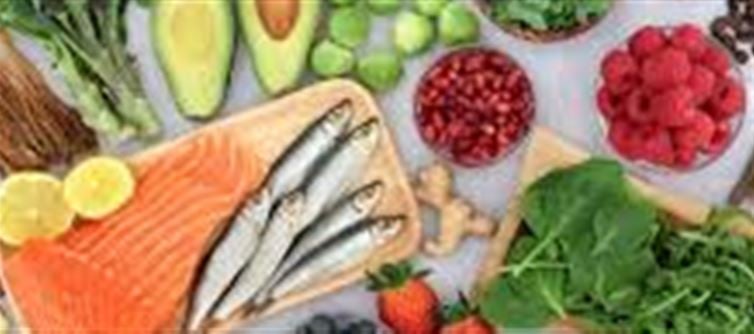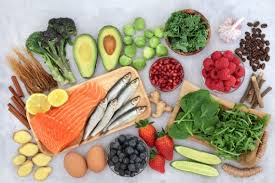
Inflammation is a crucial part of your body's immune response, but chronic inflammation can lead to health problems like arthritis, heart disease, and even cancer. Luckily, there are many ways to reduce inflammation naturally by making simple adjustments to your diet and lifestyle.
1. Eat Anti-Inflammatory Foods
Certain foods can help reduce inflammation by providing antioxidants, healthy fats, and anti-inflammatory compounds. Incorporate the following into your meals:
A. Fatty Fish
· Rich in omega-3 fatty acids, which are known for their powerful anti-inflammatory effects.
· Examples: Salmon, mackerel, and sardines.
B. fruits and Vegetables
· Packed with vitamins, minerals, and antioxidants that help reduce oxidative stress, a contributor to inflammation.
· Focus on berries, leafy greens, and cruciferous vegetables like broccoli and cauliflower.
C. Nuts and Seeds
· Almonds, walnuts, chia seeds, and flaxseeds provide healthy fats and anti-inflammatory compounds.
· Rich in fiber and omega-3s, these foods also promote overall heart and brain health.
D. Olive Oil
· Contains oleocanthal, an anti-inflammatory compound similar to ibuprofen.
· Use extra virgin olive oil in cooking or salads for a flavorful and healthy fat boost.
2. Drink Anti-Inflammatory Beverages
Certain drinks can be very effective in reducing inflammation and supporting your immune system:
A. Green Tea
· Rich in polyphenols, particularly epigallocatechin gallate (EGCG), which is a powerful anti-inflammatory agent.
· Drinking a cup or two daily can help reduce systemic inflammation.
B. turmeric Tea
· Curcumin, the active compound in turmeric, has potent anti-inflammatory and antioxidant properties.
· Add a pinch of black pepper to your turmeric to enhance absorption and effectiveness.
C. ginger Tea
· Ginger is known for its anti-inflammatory and digestive properties.
· Sip on ginger tea or add fresh ginger to smoothies, soups, or hot water.
3. Exercise Regularly
Moderate, regular exercise is one of the best ways to combat chronic inflammation:
A. Aerobic Exercise
· Activities like walking, cycling, or swimming increase blood circulation and can help reduce inflammation.
· Aim for at least 30 minutes of moderate exercise most days of the week.
B. Strength Training
· Lifting weights or using resistance bands can increase muscle mass and reduce markers of inflammation.
· Focus on full-body workouts twice a week.
C. yoga and Stretching
· yoga helps balance your mind and body, reducing stress, which is a major contributor to inflammation.
· Incorporate deep breathing exercises and gentle stretches to improve flexibility and lower inflammation.
4. Prioritize Sleep
Getting enough high-quality sleep is crucial for reducing inflammation:
A. Aim for 7-9 Hours of Sleep
· Sleep allows your body to repair itself and regulate inflammatory processes.
· Prioritize a consistent sleep schedule and avoid caffeine or electronics before bedtime.
B. Improve Sleep Quality
· Create a calm, cool sleep environment.
· Practice relaxation techniques like meditation or reading to improve your sleep quality.
5. Manage Stress Effectively
Chronic stress is a key contributor to increased inflammation in the body. Here’s how to manage it:
A. Practice Meditation or Mindfulness
· Mindfulness practices help activate the parasympathetic nervous system, which calms the body and reduces stress.
· Try guided meditation, deep breathing, or progressive muscle relaxation.
B. Spend Time in Nature
· Connecting with nature has been shown to reduce cortisol levels and lower stress.
· Take a walk in the park, enjoy a hike, or simply relax outdoors.
6. Avoid Inflammatory Triggers
Certain lifestyle factors can increase inflammation, so it’s essential to avoid or limit them:
A. Limit Processed Foods
· Refined sugars, trans fats, and artificial additives in processed foods can trigger inflammation in the body.
· Instead, focus on whole, unprocessed foods that are naturally rich in nutrients.
B. Cut Back on Alcohol
· Excessive alcohol consumption can increase inflammation, particularly in the liver and digestive system.
· Stick to moderate alcohol intake, if any, to keep inflammation in check.
C. Quit Smoking
· Cigarette smoke contains toxins that trigger inflammation throughout the body.
· Quitting smoking is one of the most effective ways to reduce chronic inflammation.
7. Add Anti-Inflammatory Spices to Your Diet
Incorporating the following spices can help lower inflammation:
A. Turmeric
· Contains curcumin, a powerful anti-inflammatory compound that can help lower joint pain, improve digestion, and fight oxidative stress.
B. Cinnamon
· Contains cinnamaldehyde, which has anti-inflammatory and antioxidant effects.
· Sprinkle cinnamon on your morning oats, smoothies, or in your coffee for an extra health boost.
C. Garlic
· Known for its anti-inflammatory and immune-boosting properties.
· Add fresh garlic to salads, soups, and stir-fries for flavor and health benefits.
8. Maintain a Healthy Weight
Excess fat, particularly around the abdominal area, can promote inflammation. Maintaining a healthy weight through diet and exercise can significantly reduce systemic inflammation. Focus on nutrient-dense foods and regular activity to manage weight effectively.
Conclusion: A Holistic Approach to Inflammation
Reducing chronic inflammation requires a combination of dietary changes, regular physical activity, stress management, and lifestyle modifications. By making these simple changes, you can enhance your overall health, reduce the risk of chronic diseases, and feel better every day.
Disclaimer:
The views and opinions expressed in this article are those of the author and do not necessarily reflect the official policy or position of any agency, organization, employer, or company. All information provided is for general informational purposes only. While every effort has been made to ensure accuracy, we make no representations or warranties of any kind, express or implied, about the completeness, reliability, or suitability of the information contained herein. Readers are advised to verify facts and seek professional advice where necessary. Any reliance placed on such information is strictly at the reader’s own risk.





 click and follow Indiaherald WhatsApp channel
click and follow Indiaherald WhatsApp channel